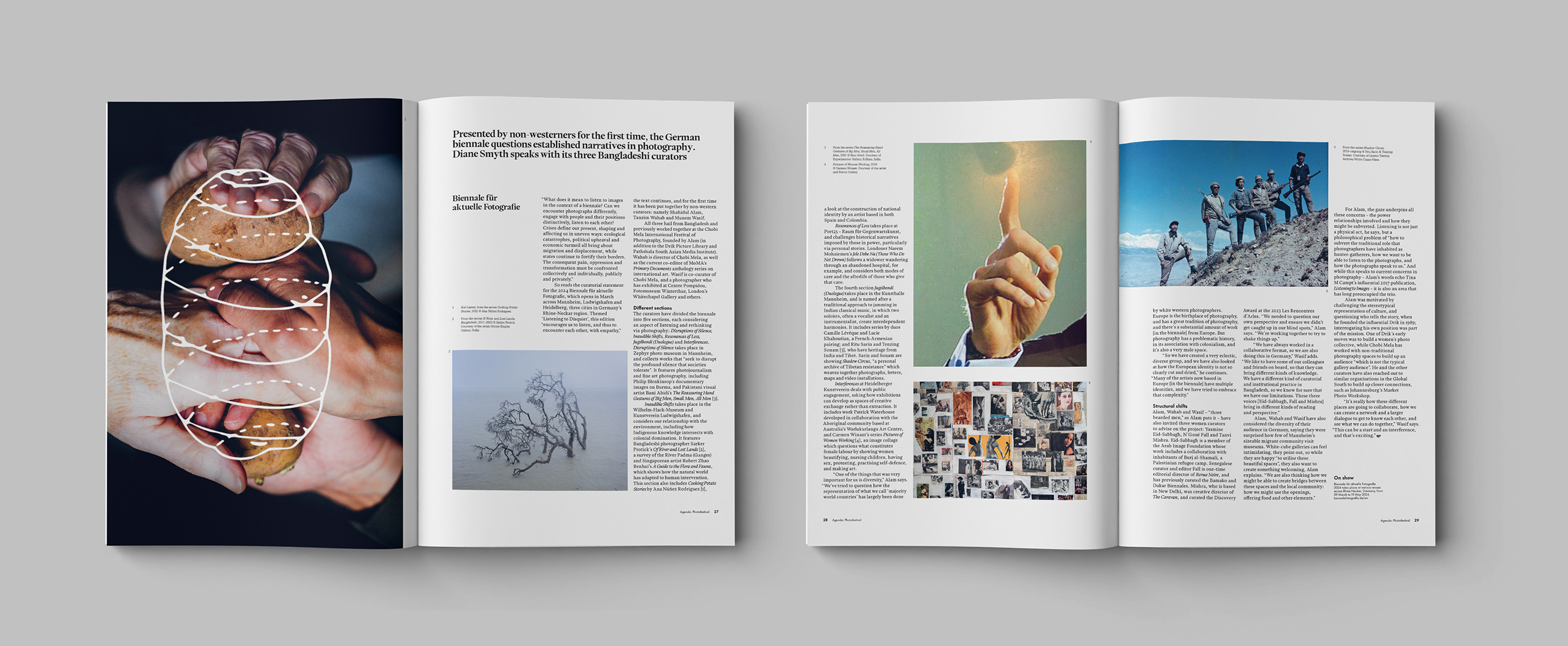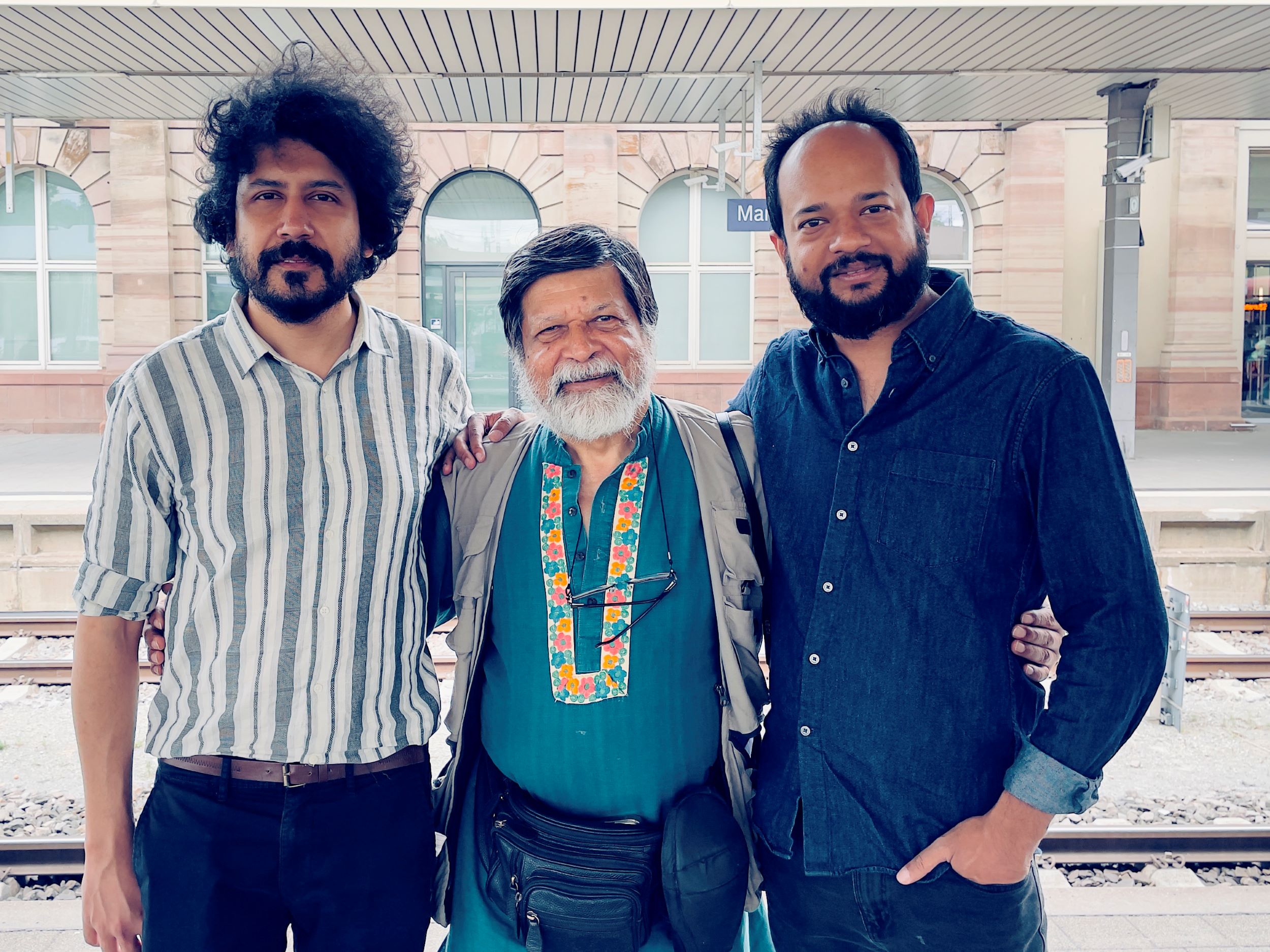The three curators of the 2024 Biennale fur aktuelle Fotografie in Germany, which has now been cancelled. [L-R] Tanzim Wahab, Shahidul Alam, and Munem Wasif, photographed in Mannheim train station © Salma Abedin Prithi
Featured in the Agenda section of our upcoming Portrait issue, the Biennale has been cancelled in response to Facebook posts by one of its three Bangladeshi curators – sparking contention between the organisers and curatorial team
BJP’s December Portrait issue features a four-page interview with Shahidul Alam and Munem Wasif who, with Tanzim Wahab, were scheduled to curate 2024 Biennale fur aktuelle Fotografie across three German cities: Mannheim, Ludwigshafen and Heidelberg. Giving the Biennale the theme Listening to Disquiet, the trio – who are all from Bangladesh – invited a global cohort of photographers and artists to contribute work to an edition opening in March, and encouraging visitors “to listen, and thus encounter each other, with empathy.” The event has now been cancelled. After BJP’s editorial team finalised the Portrait issue, while it was being printed and distributed, the Biennale’s board and the three cities’ mayors of cultural affairs, in agreement with the longstanding main sponsor BASF, decided that Alam’s social media activity since the Hamas terrorist attack on Israeli civilians on 07 October meant the Biennale could not go ahead.
In a press release dated 21 November, the Biennale für aktuelle Fotografie – the board, the management and the cultural departments of the organising cities – stated that the relationship of trust between it and the three curators had been severely damaged; that various Facebook posts by Alam since 07 October had given a platform to content that can be read as antisemitic, and antisemitic content; that although discussions took place with the three curators “to sensitise [them] to Germany’s special historical responsibility for the State of Israel and its right to exist”, Alam continued with similar posts; and that Alam is not considered to have assumed any responsibility in his public function as a curator in the Biennale team. The press release adds that Wahab and Wasif were asked if they wanted to continue the Biennale without Alam, and they “replied in the negative”.
Alam, Wasif, and Wahab have responded with their own statement, which asserts that they are “dismayed by the decision of the director, Yasmin Meinicke, and the Board of the Biennale für aktuelle Fotografie, taken in consultation with German state authorities to unilaterally cancel the 2024 edition”. The curators have worked for 18 months with 44 artists, six partner organisations, three advisors, and various other colleagues, they add, yet found out about the cancellation via the Biennale’s press release in the public domain. “We find the conduct of the director and the Board of the Biennale to be a breach of trust and antithetical to the very premise of the theme we were intending to explore in this edition,” they continue. “Further, it is in violation of our contractual agreement, which states, ‘All press releases are published in agreement with the curator and the managing director of the Biennale’.”

The curators continue that they discussed Alam’s social media activity relating to Palestine with the Biennale management for a month and that, while Alam’s posts were a response to the actions of the Israeli government, “the Biennale incorrectly equated these to antisemitism”. “We feel that the failure to draw a distinction between criticism of a government and of a peoples, is irresponsible and damaging to the honesty of public discourse,” they state; they later add that, “our acknowledgment of the history of the Palestinian cause, and the present assault in Gaza on civilians, does not, in any way, translate to us dismissing the historical persecution of the Jewish people. Such a conflation is a deliberate and dangerous misreading of our position. It is this shrinking space for care towards the persecution of any community, that we seek to address in the critical space of arts, education, and discourse.”
Alam, Wasif, and Wahab go on to question their position as curators from the majority world working with a western institution. Many from the Global South invited to work with such institutions are sceptical about how much their diversity is being tokenised or instrumentalised, they write, and how open these spaces are to radically different ways of thinking. “Our difference of perspective – shaped by our colonial past – in reading history and its contemporary fallouts is seen as a reason to educate or ‘sensitise’ us,” they state. “We were invited to curate the Biennale because they claimed they wanted our voice, and our perspective on how we see the world. But in a moment of crisis, it has appeared that our voices were only invited on their terms, subservient to their conditions.”
The three curators have been publicly supported by Yasmine Eid-Sabbagh and Tanvi Mishra who, along with N’Gone Fall, were invited by the trio to advise on the Biennale. Eid-Sabbagh is a member of the Arab Image Foundation; Fall is one-time editorial director of Revue Noir, who has previously curated the Bamako and Dakar Biennales; while Mishra, who is based in New Delhi, was creative director of The Caravan, and curated the Discovery Award at the 2023 Les Rencontres d’Arles. Adding to the curators’ statement, Eid-Sabbagh writes that “this disdainful form of scapegoating of Dr. Shahidul Alam and many others is outright censorship”, while Mishra adds that she stands in full solidarity with all three curators.
“We were invited to curate the Biennale because they claimed they wanted our voice, and our perspective on how we see the world. But in a moment of crisis, it has appeared that our voices were only invited on their terms, subservient to their conditions” – Shahidul Alam, Munem Wasif and Tanzim Wahab
“We often see western cultural institutions call upon the labour of many, under the ostensible premise of supporting a diversity of voices and fostering critical thought,” writes Mishra. “However, this decision of the Biennale to cancel an entire edition over Shahidul’s social media posts and to communicate it through a press release before they even personally informed the curators, reveals a hierarchical mindset. By offering an invitation, it is assumed that they define the parameters of this diversity, and a critical lens can be used to view the rest of the world, but not themselves. It is worth asking then, if these so-called collaborations are meant for toeing the institutional line and if those invited must express gratitude, in so far as, posing no challenge to that position.”
Eid-Sabbagh points to what she sees as similar previous cases, in particular Achille Mbembe’s dis-invitation from speaking at the Ruhrtriennale in 2020. Since 07 October 2023, other cultural events in Germany have also been cancelled or curtailed. On 13 November, Haitian-born curator Anais Duplan’s Afrofuturism exhibition at the Museum Folkwang was cancelled by the museum’s director Peter Gorschluter on the grounds that Duplan’s social media posts did not “acknowledge the terroristic attack of Hamas and consider the Israeli military operation in Gaza a genocide”. Documenta’s Finding Committee resigned on 16 November in solidarity with Ranjit Hoskote, meanwhile, who was accused of antisemitism when it emerged he endorsed a Boycott, Divestment, Sanctions petition in 2019.
Meanwhile in the UK, Bristol’s Arnolfini Gallery cancelled two events as part of the city’s Palestine Film Festival, a screening and a poetry evening due to be held in early December. In a release published on 21 November, the gallery stated it had taken this “difficult decision” on the grounds that “hosting events which combine film, performance and discussion panels meant we could not be confident that the event would not stray into political activity”, and that it does not have the resources to “adequately risk assess [such] events”.

